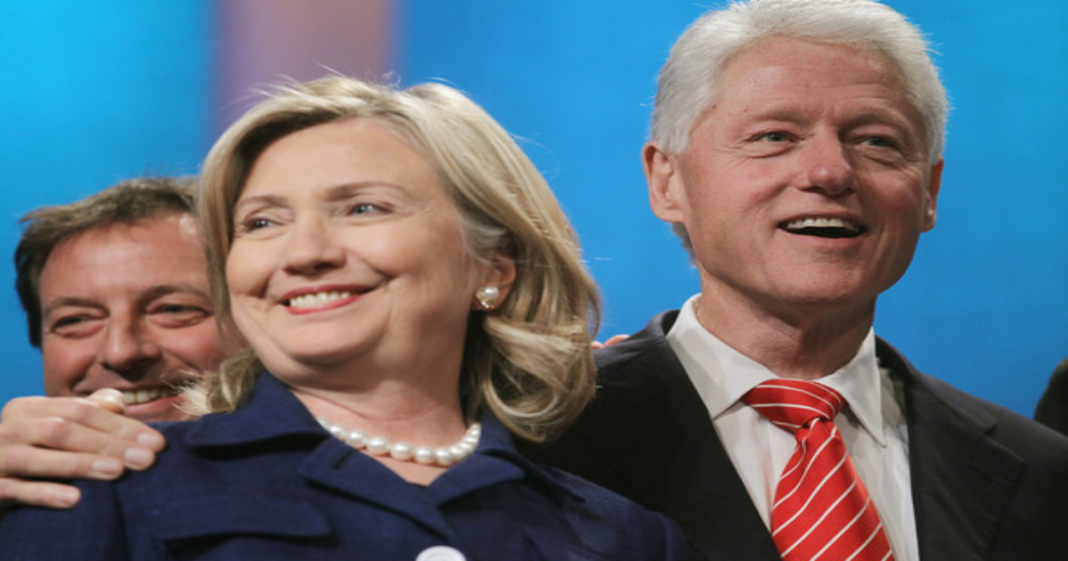The Clinton campaign is getting desperate, as demonstrated by Bill’s increasingly vocal and vicious attacks on New Hampshire front-runner Bernie Sanders. Last week in Iowa, he was focusing on Hillary’s early career, when she was indeed an idealistic, even progressive young attorney, attempting to “soften” his wife’s current image. This week, the gloves came off.
Accusing “Hillary’s opponent” of being “the champion of all things small and the enemy of all things big” (gee, Bill – is that a bad thing? Isn’t it about time that “all things small” had a champion?), Mr. Clinton proceeded to go off on what he considers to be inconsistencies in Bernie’s record and vagueness when it comes to his stated policies (apparently, Mr. Clinton has not been to Bernie Sanders’ website).
For example, he attacked Sanders over his presence at Democratic fundraisers held during retreats in Martha’s Vineyard and Palm Beach back in 2006 – which were attended by big money donors from the financial sector. It is true that Sanders, an Independent who caucuses with Democrats in Congress, did speak at those events. However, the money raised went to the Democratic Senatorial Campaign Committee (DSCC) – not to Sanders’ Senate campaign specifically. The fact is that the oligarchy, while generally favoring the GOP, likes to hedge its bets. The fact, then as now, is that political campaigns cost money. In 2006, Goldman-Sachs, Citigroup, Morgan Stanley and JP Morgan Chase gave nearly $1.5 million to the DSCC, an organization to which Sanders and his fellow Senators pay substantial dues and from which all Democratic candidates have benefited – including Hillary. It’s worth pointing out that commercial banks have consistently donated more to the GOP than to Democrats in every election cycle since 1994.
In any event, raising money on behalf of the party isn’t the same as taking direct, personal donations for one’s individual campaign – so Bill’s argument on that score seems at best, disingenuous.
Bill Clinton also brings up what on the surface seems to be Sanders’ single “pro-Wall Street” vote, which he cast in 2000 as a member of the House. That vote was in favor of HR 4541, the “Commodity Futures Modernization Act.” That legislation, signed into law by President Clinton himself, deregulated so-called “financial instruments” such as credit default swaps and derivatives – which was a major factor in the crisis of 2008.
To hear Bill and Hillary tell it, Sander’s vote on that legislation makes him a hypocrite. However, the truth is more complicated. The first incarnation of that bill, for which then-Representative Sanders voted, made provisions for regulators to investigate and stop fraudulent uses of derivatives. However, when the bill went to the Senate, those provisions were blocked by Texas GOP Senator Phil Gramm. Before the House and Senate versions could be reconciled, Congress adjourned.
Then came the infamous “election” of 2000. While the nation’s attention was focused on Florida and “hanging chads,” Gramm and his buddies quietly slipped in a provision which eventually became known as the “Enron Loophole.” The bill that Sanders originally voted for may not have prevented the financial meltdown of 2008, but it would have allowed regulators some power to mitigate the damage. The bill that President Clinton signed off on just before leaving office contained no such legislative safety switch – and we have Phil Gramm and Bill Clinton to thank for that.
In any event, it was a single vote, cast over fifteen years ago. During her tenure as junior Senator from New York, Hillary Clinton’s pro-Wall Street leanings (as well as her pro-war stance) is abundantly clear. Her record stands in stark contrast to that of Bernie Sanders.
Of course, Bill Clinton isn’t stopping with dubious attacks on Sander’s fund raising activities and voting record. He’s dredged up the incident this past December in which a Sanders staffer gained unauthorized access to Clinton campaign voter data. Sanders took responsibility for that incident and fired the staffer.
In his statements against Sanders, Bill Clinton comes off like the Devil who is able to quote Scripture to serve his purposes. His statements contain just enough of the truth to sow seeds of doubt – but when the deeper truth underneath is exposed, those statements are revealed as the desperate rantings of a Hillary supporter who is feeling the Bern – and realizes that her victory is not a foregone conclusion.




![Senator Schumer: “Single Payer [Health Care] is On The Table”](https://sandbox.trofire.com/wp-content/uploads/2017/07/Universal-Healthcare-218x150.jpg)